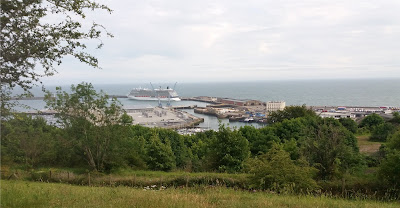Like virtually everyone who owns a Smartphone, I get
news-feeds popping up on my screen from time to time and, thanks to Google,
which has already made a careful note of my preferences, likes and dislikes,
quite a few of these news stories are beer related. (I receive quite a few
music-related ones as well, but that’s a different story).
One item which caught my eye the other morning, was footage
taken from a drone flight, over the centre of Blackburn, Lancashire – the town
with the 4,000 holes, according to the Beatles’ song, “A Day in the Life.” The
footage captured the demolition work being carried out on the former Thwaites Brewery which, until recently, dominated the local skyline.
The decision to demolish the nine storey building tower, was
made last year after Thwaites brought to an end 211 years of brewing in Blackburn.
This followed a downsizing of the company’s brewing activities and the sale of
a number of key brands to Marston’s (Wainwright's and Lancaster Bomber); a move that saw brewing transferred to a
new, purpose-built plant at Mellor Brook in August 2018.
I am writing about this because Thwaites was one of the
first breweries I visited. It wasn’t actually my first brewery tour, as that
honour went to Marston’s of Burton-on-Trent;
somewhat ironically, in view of what is written above. Instead the trip I made
to Thwaites’ Blackburn plant was the first of many such
tours I have organised over the years, initially for a university society, but
then on behalf of my local CAMRA branch.
That trip would have taken place sometime in late 1974, when
I was in my second year as a student at Salford
University. What struck me at the
time, especially after having visited Marston’s the previous year, was just how
modern Thwaite’s brewery was. The nine storey structure, topped with its illuminated
sign, dominated the town and made quite an impression on a 19 year old youth
who was just starting out on his drinking career.
We were told that the brewery had been completely re-built,
on the same site, during the mid-1960’s, and was constructed as a traditional
tower brewery, whereby the process starts at the top, and then gradually flows
downwards, using gravity to do the work. I don’t remember much about that
visit, although I do recall being taken into a nearby pub, by the tour guide,
for a few complimentary pints. I also recall, measured, cylindrical electric
pumps being the order of the day.
With this in mind, I found it sad to see footage of this
impressive structure being pulled to the ground. The end of an era and the
result of changing tastes within the beer market and the pub trade.
A quick word about Thwaites, with particular reference to
the four years I spent living in the Greater Manchester area. The company
produced three cask ales at the time, a light, but well-hopped bitter, which
was very quaffable, plus two milds. The ordinary mild was dark and creamy,
whereas the Best Mild was much paler in colour.
The majority of Thwaites pubs were situated in the north of
the region, with a large concentration in and around the town of Bury, which lies to the north of Manchester.
I understand this followed the takeover, by Thwaites, of the local brewery
several decades previously.
Bury was quite easy to travel to, either by bus, from Salford,
or by means of the train from Manchester Victoria.
For the train buffs out there, that particular line was unusual in having a
third electric “juice” rail, similar to that in use on the old Southern Region
of British Rail.
During the early 1990’s, the line was converted into a
tramway, using the original track-bed and stations, but now powered by an
overhead electric system. It forms part of the Manchester Metrolink, and
incorporates another former rail line which runs from the city centre, to
Altrincham.
For Salford University
students, it wasn’t always necessary to journey to Bury for a pint of Thwaites,
because toward the end of my second year, the brewery obtained the contract to
supply the Student Union Bar. The beer was tank, rather than cask, but still
streets ahead of the Tartan and Tetley fizz stocked previously.
Returning to the main story, for a minute or so, I suspect the good people of Blackburn
must be sad that the brewery which looked down on them for all these years, and
which was such a familiar sight, is alas no more. But if you are fortunate to
come across a pub selling Thwaites, and in particular, their dark mild, treat
yourself to a glass and raise it in memory of a vanished piece of our heritage.
Photos - Wikipedia and Lancashire Telegraph









































